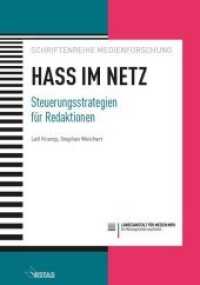Full Description
This book focuses on how teachers can transmit and practice values through classroom circles that attend to and empower all students' voices. A growing number of teachers are using relational pedagogy, drawing on Indigenous circle practice, as a pedagogical tool. Done well, circles can build and sustain dialogue and peaceful relations. Done poorly, circles reflect and reinforce relations of power, which, if disregarded, can be damaging for participants whose voices are silenced or not sufficiently heard. Parker-Shandal's consideration of teachers' professional learning and training in restorative justice in education focuses on ethnographic, classroom-based research in diverse urban elementary schools. Her data include observations of classrooms, teacher surveys, and interviews with students, teachers, and principals. The book provides a detailed account of the lived experience of students and teachers as they engage with and experience the transformative power of constructive dialogueabout conflicts embedded in curriculum subject matter through restorative justice pedagogies.
Contents
1. Circles: A Pedagogical Praxis for Inclusion and Resistance.- 2. Transforming Justice in Diverse Classrooms.- 3. Building a Sustainable Practice: Restorative Training and Mentorship.- 4. Implementing Restorative Teaching in Five Elementary Schools.- 5. The Pedagogical Value of Conflict: Dialogue and Dissonance in Restorative Classrooms.- 6. Relational Connections in Classroom Curriculum: Power and Privilege in Diverging Perspectives.- 7. Classrooms of Control and Connection: Restorative Approaches to Building Community and Resolving Interpersonal Conflicts.- 8. Educating for Justice: Building Restorative Futures for Students to Thrive In.








